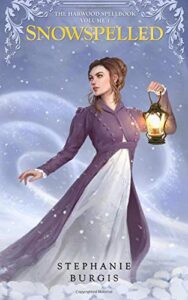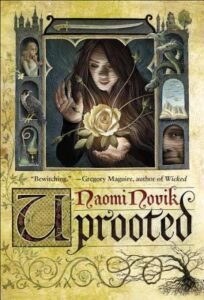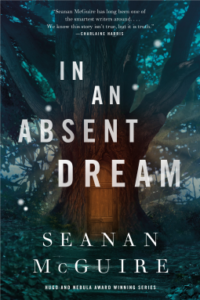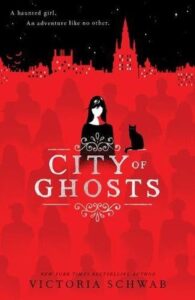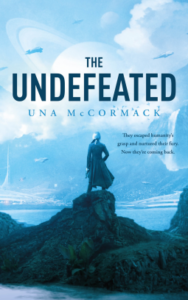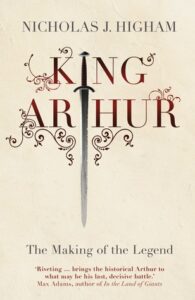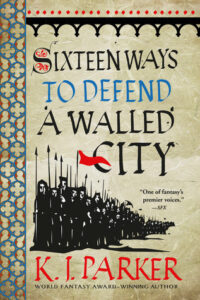 Sixteen Ways to Defend a Walled City, K.J. Parker
Sixteen Ways to Defend a Walled City, K.J. Parker
Sixteen Ways to Defend a Walled City follows the exploits of Orhan, an engineer in the Robur army. He’s a bit of coward, not always a very nice guy, and when he realises there’s a massive invasion of some sort coming, he’s very tempted to go in the exact opposite direction. But it turns out he’s kind of fond of the Robur, at least some of them, despite the treatment he gets from a lot of them due to his unfortunate skin condition (by which he means his race), and somehow he ends up back in the city, which is about to be besieged, and it’s entirely possible the place won’t last an hour.
Well, Orhan’s got the skills for that, right? So he sets about tricking the enemy, fortifying the city, shaking things up and getting things in place so the city can survive. The book goes on like that, from crisis to crisis — how does he find defenders? How does he ensure a supply of water? How does he deal with sappers? How does he deal with a riot? Tick, tick, tick, tick: Orhan survives each encounter, outwits the enemy, and saves the city, at every step.
Right?
I found some aspects of the book deeply frustrating at the same time as enjoying them. I liked the conceit at the end about the manuscript provenance — the story is told directly by Orhan, and then there’s a tiny bit of framing story at the end explaining why he told the story, and how people come to read it. It also drove me crazy because the end is so abrupt, and everything about it is unclear. I liked the fact that he’s an unreliable narrator, that despite his frank tone and easy admittance of his faults, he also admits to making himself look better in the narrative. It also drives me crazy because I’m not entirely sure which bits he’s lying about. I like the fact that the story doesn’t follow a traditional trajectory and then that also drives me crazy because argh, I thought the ending would be different.
I’m really unsure about the decision to have the darker-skinned people (“blueskins”, in Orhan’s parlance) as the dominant race and the clearly white people (“milkfaces”) as the oppressed people, as a direct copy/paste of real events. At one point, Orhan uses a drinking fountain in a garden and is scolded by a keeper who doesn’t recognise him; the tap is for Robur only. I feel like this direct flip can cause some cognitive dissonance in a good way, pointing out the ridiculousness of the discrimination, and that’s probably how it was intended. At the same time, putting the crimes of white people on people of colour, just flipping history to make people of colour everything that’s wrong with the Empire… I’m fairly sure that people of colour have had a lot to say about people doing that; I’ve certainly denounced it when people flipped it so gay people were oppressing straight people. That kind of one-to-one flip, the copy-and-paste, just feels like laziness more than commentary. At the same time, the book does make it clear how okay people can be complicit in terrible things: there are several characters who are friends to Orhan, basically likeable people, who just don’t see the situation and how Orhan is treated, and don’t see it as a problem when they are forced to see it.
I kept saying I’d figure out how I felt about this book by writing the review, but it isn’t really helping. I think in the end, I wish the book were a little less ambiguous and ambivalent; I feel unsatisfied because the frame story is so slight, because the ending didn’t build up to anything in the way I’d expected. There’s a lot of things I liked about the book, and I wouldn’t say the things I didn’t like are or should be a total dealbreaker. But overall, I feel pretty dissatisfied — I don’t think this is a book that’s built to have a satisfying ending that isn’t totally cliché, and that dissatisfying end is totally baked into it… but even as I recognise that and the way it was all put together, it annoyed the heck out of me.
I think I’ll go for three stars here, which is normally “liked it”, but in this case should be read as “ambivalent in a way that doesn’t mean I don’t care, I just really can’t decide”. I wouldn’t rate it lower than a 2, and I wouldn’t rate it higher than a 4, and 3 is the median, so… there.
Rating: 3/5
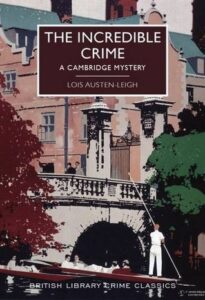 The Incredible Crime, Lois Austen-Leigh
The Incredible Crime, Lois Austen-Leigh
